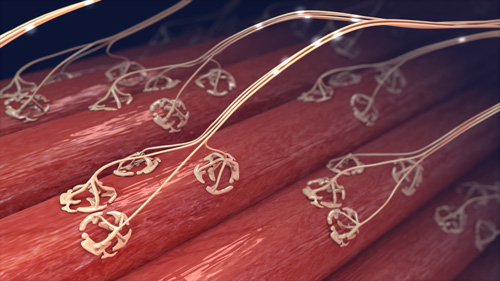An industry-university team reports that continuous treatment of mouse models of spinal muscular atrophy (SMA) with RNA splicing compounds increased life span, normalized body weight, and prevented both disease-related motor dysfunction and neuromuscular deficits. The specific compounds in question are orally available RNA splicing modifiers of the SMN2 gene that are given early after birth.
“Although still preclinical, these results demonstrate how SMN2 splicing modifiers could correct the molecular deficit that causes SMA,” said Luca Santarelli, M.D., head of neuroscience, ophthalmology and rare diseases at Roche Pharma Research and Early Development. “This study represents an important step toward developing a potential therapeutic option for this devastating and currently untreatable condition. Early clinical trials are currently underway to determine the safety and tolerability of this approach.”
In addition to Roche, researchers from the SMA Foundation, the University of Southern California, Harvard, and PTC Therapeutics formed the team that reported its study (“SMN2 splicing modifiers improve motor function and longevity in mice with spinal muscular atrophy”) in Science.
“Spinal muscular atrophy (SMA) is a genetic disease caused by mutation or deletion of the survival of motor neuron 1 (SMN1) gene. A paralogous gene in humans, SMN2, produces low, insufficient levels of functional SMN protein due to alternative splicing that truncates the transcript,” wrote the investigators. “The decreased levels of SMN protein lead to progressive neuromuscular degeneration and high rates of mortality. Selective SMN2 splicing modifiers may have therapeutic potential for patients with SMA.”
“The investigational compounds used in this study represent the first orally available SMN2 splicing modifiers for SMA,” added Stuart W. Peltz, CEO of PTC Therapeutics. “Using the experience and expertise in RNA biology we have gained at PTC over the last 16 years, we used our alternative splicing technology to identify and subsequently optimize investigational compounds that target the SMN2 splicing to produce the SMN protein. Our unique partnership with Roche and the SMA Foundation has allowed this project to rapidly move into clinical development.”
The study used chemical screening and optimization to identify orally available small molecules that selectively alter the splicing of the SMN2 pre-mRNA to produce stable full-length SMN protein. The SMN2 splicing modifiers penetrated into all mouse tissues tested, including brain, spinal cord, and muscle, and thus improved SMN2 RNA splicing to increase SMN protein production in these disease-relevant tissues.
As a result of the SMN protein increase, the compounds prevented the progression of SMA in a severe mouse model. These compounds also corrected SMN2 RNA splicing and increased SMN protein levels in cell cultures obtained from SMA patients, including stem cell-derived motor neurons.
A Phase I clinical program to assess safety and tolerability with investigational compounds began early this year.







